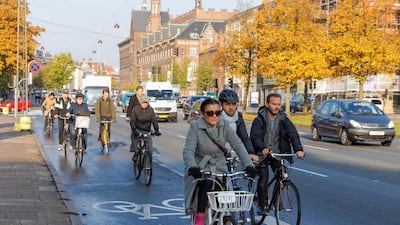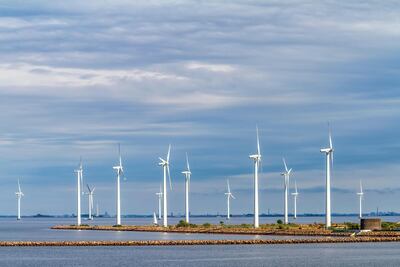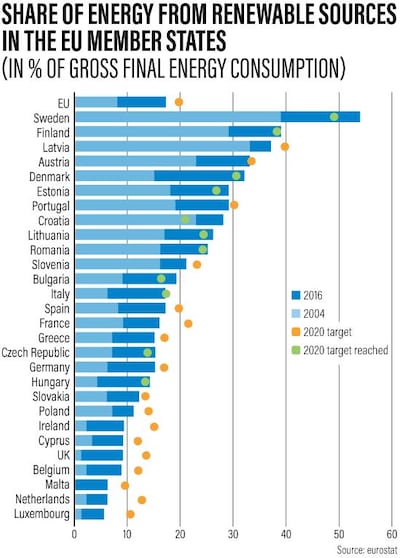Around the world, more than 70 major cities have pledged to end their reliance on fossil fuels and stop pumping out climate-changing emissions by 2050.
But Copenhagen - a city of wind turbines, bicycles and reliable public transportation - thinks it can go even further: it intends to accomplish that shift in just seven years.
It will require a complete reimagining of how the Danish capital is powered and designed - and a lot of cyclists, officials admit.
"Why are we going for that? People might say what we do in Copenhagen doesn't really matter on the global stage at all. We are tiny," said Jørgen Abildgaard, director of the city's climate programme.
But with cities and countries around the world still searching for ways to turn the 2015 Paris agreement on climate change into a reality, "it's important to show that it's possible to make this transition", he said.
Scandinavian cities have long been seen as green leaders - and Copenhagen is no exception.
While other cities have parking garages for cars, Copenhagen has them for bicycles. Virtually all its 600,000 residents own a bicycle, and the city has 375 kilometres of dedicated cycle lanes.
The harbour-rimmed municipality also is mostly powered by clean energy - and it has its own renewable energy company and wind turbines.
Running its own energy systems is one of the reasons Copenhagen is already well on track to being carbon neutral - meaning it will produce no more carbon emissions than it can offset elsewhere - by 2025.
As a whole, Denmark passed its 2020 target for share of renewable energy in the country's total power production more than two years ago.
The city's concerted efforts to go green put it firmly ahead of the schedule set by almost 200 nations in Paris to effectively phase out greenhouse gases between 2050 and 2100.
Leading climate scientists will warn next week that global carbon emissions from energy use will have to plunge by up to seven percent a year to meet Paris' toughest goals - unless technologies to suck carbon from the air and store it are developed, according to a draft UN report obtained by Reuters.
Copenhagen's officials are confident the city can largely achieve its ambitious goals.
"We want to be 100 per cent [carbon neutral by 2025]. But if we are 95 percent or around that, it's still a big success," said Mr Abildgaard, who has overseen the city's efforts toward carbon neutrality ever since it made its pledge in 2009, when it hosted UN climate talks.
In 2017, Copenhagen produced about 1.37 million tonnes of climate-changing gases, down 40 percent from 2005, according to city figures.
That's about 2.2 tonnes of emissions per capita, one of the lowest rates for a European city.
The city said the reduction in emissions was largely due to a switch to wind energy under Hofor, the city's own utility company.
"We are some of the muscle that the city has to be able to [use to] reach its goals," said Jörgen Edström, head of strategy and business development at Hofor, one of many energy companies in the city.
"The city wanted to build windmills to compensate for its electricity consumption - so we built windmills. They have a company to do the things they want to do," he said.
_______________
Read more:
Maersk spins off drilling unit as it mulls exit from fossil fuels
Statoil, Norway's biggest oil company renames to prepare to embrace a cleaner future
_______________
Hofor has invested billions of euros to build 360 wind turbines by 2025 to power most of the city, and will soon replace its coal-fired power plants with biomass-powered units that burn sustainable wood pellets, the company says.
Around the world, cities consume more than two-thirds of the world's energy and account for about three-quarters of carbon dioxide emissions, according to the United Nations.
That means finding ways for cities to become carbon neutral will be key to meeting the Paris commitment to keep the rise in global temperatures to "well below" 2°C above pre-industrial levels.
"Cities are where the emissions are the largest. So if cities can solve the problems, then that's part of the way to a more carbon neutral world," Mr Edström said.
In its quest to cut emissions, Copenhagen has another distinct advantage: for over 100 years, the city - and Denmark as a whole - has relied on district heating, a system where heat is produced and supplied from one neighbourhood or area plant, instead of per household.
That means the city itself can make the switch to cleaner energy for large numbers of residents, cutting carbon emissions by over half compared to the use of individual gas or oil boilers, Hofor says.
The city also has a newly-built district cooling system, which uses seawater to cool buildings and households, cutting energy consumption up to 80 percent compared to traditional methods of air-conditioning, Hofor said.
By 2025, Copenhagen aims to be powered entirely by wind, sun, geothermal energy, waste, and wood and other biomass.
Yet despite its huge investment in new, clean technologies, one of the city's big priorities is cutting prices for energy users.
"The municipality didn't say, 'Spend all the money to achieve the carbon-neutral agenda.' They said, 'We want lower prices and we want carbon neutrality'," Mr Edström said.
That aim looks to be within reach. A couple living in a flat will save an average of 4,000 Danish kroner (Dh2,272) each year on energy consumption if Copenhagen reaches its climate goals, the city says.
Mr Abildgaard, Copenhagen's climate director, said it was crucial to work closely with industries such as construction and transport to devise business models and technologies that work both to meet business goals and cut emissions.
Copenhagen plans to spend at least 2.7 billion Danish kroner by 2025 to roll out its plan to achieve carbon neutrality - but that should attract nearly 300bn kroner in private green investment, according to the city council.
"The whole holistic view is important. Environment issues are part of the DNA here. But we also have to recognise that this is not the situation around the world," Mr Abildgaard said.



